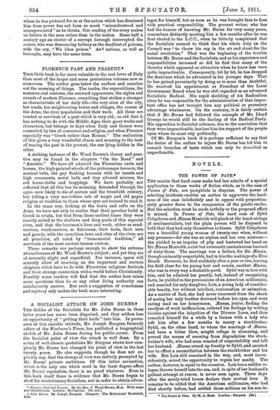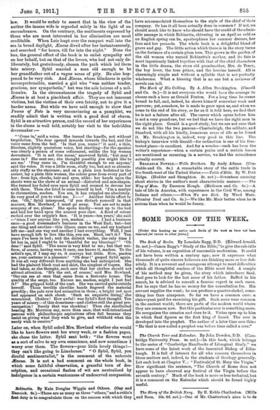NOVELS.
THE PAWNS OP FATE.* THE maxim that hard cases make bad law admits of a special application to those works of fiction which, as in the case of Pawns of Fate, are pamphlets in disguise. The power of selecting incidents enables an author to aggravate the hard- ness of the case indefinitely and to appeal with proportion- ately greater force to the compassion of the gentle reader. But the selection must be made artfully or the proposed effect is missed. In Pawns of Fate, the hard case of Sybil Colquhoun and lEneas Monteith will pluck at the heart-strings of sentimentalists, but the plain person will be disposed to hold that they had only themselves to blame. Sybil Colquhoun was a beautiful young woman of twenty-one when, without any pressure—for she was an orphan and her own mistress— she yielded to an impulse of pity and bestowed her hand on Sir 2Eneas Monteith, a rich but extremely cantankerous baronet of sixty-three. The marriage was a failure, for Sir 2Eneas, though eminently respectable, had in him the makings of a Blue Beard. However, he died suddenly after a year or two, leaving the field clear for his young heir and cousin, another ./Eneas, who was in every way a desirable parti. Sybil was in love with him, and he admired her greatly, but, instead of recognizing facts, he yielded to the persuasions of an American millionaire, and married his only daughter, Lois, a young lady of consider- able beauty, but without intellect, conversation or animation. As a matter of fact, she had never recovered from the shock of seeing her only brother drowned before her eyes, and went raving mad on her honeymoon. Aneas, junior, finding the anodyne of work inefficacious, relieved his feelings by writing tirades against the iniquities of the Divorce Laws, and then consoled himself for a while by a liaison with a lady who left him after a few months to marry a stockbroker. Sybil, on the other band, to whom the marriage of Aneas had been a bitter blow, sought refuge in slumming, and proved the means of rescuing from degradation the stock- broker's wife, who had soon wearied of respectability and left her husband. /Eneas owned up frankly to Sybil, and assisted her to effect a reconciliation between the stockbroker and his wife. But Lois still remained in the way, and, most incon- siderately, seized the opportunity to regain her sanity. The author, however, is equal to the occasion. Lois has a sudden re- lapse, throws herself into the sea, and, in spite of her husband's gallant attempt at rescue, is never seen again. Three days after the sorely-tried lovers declare their mutual love. It remains to be added that the American millionaire, who had died shortly before, had settled three millions on his son-in- 'The Rams of Fate. By M. A. Ross. London Harpers. [60.] law. It would be unfair to assert that in the view of the author the insane wife is regarded solely in the light of an encumbrance. On the contrary, the sentiments expressed by those who are most interested in her elimination are most creditable. When Lois leapt over the rampart wall into the sea in broad daylight, 2Eneas dived after her instantaneously, and searched "for hours, till far into the night." None the less, the general effect of the book is to enlist sympathy not on her behalf, but on that of the lovers, who had not only de- liberately, but gratuitously, chosen the path which led them into misery. Sybil married a man old enough, to be her grandfather out of a vague sense of pity. He also hap- pened to be very rich. And .2Eneas, whose blindness is quite incomprehensible, married a girl who "was neither tender, gracious, nor sympathetic," but was the sole heiress of a mil- lionaire. In the circumstances the tragedy of Sybil and Aneas is at best a pinchbeck affair. They are not innocent victims, but the victims of their own fatuity, not to give it a harder name. But while we have said enough to show that Pawns of Fate is very unconvincing as a pamphlet, we readily admit that is written with a good deal of charm. Sybil is an attractive person, and the record of her experiences in the slums is well told, notably her visit to the bedridden dressmaker :— "'Come in,' said a voice. She turned the handle, not without trepidation. The door opened inwards towards the bed, and the voice came from the bed. 'Is that you, nurse ? ' it said a thin, fibreless, slightly querulous voice, but startling—for the speaker was clearly a person of some refinement, unlike the big woman
downstairs. It is not the nurse,' answered Sybil; may I come in ? She sent me; she thought possibly you might like to see me.' Pray come in. I'm thankful enough to see anyone,' said the voice. It was a little room, stuffy too, but not so abomin- ably stuffy as the staircase; and on a plain iron bedstead in the corner, lay a plain thin woman, the colour gone from every part of her : from lips, cheeks, hair and eyes, alike : her hands upon the sheets were as the claws of an animal—distorted and mis-shapen. She turned her faded eyes upon Sybil and seemed to devour her with them. Then she tried to raise herself in bed. `I'm a martyr to rheumatism, madam. You see, it has crippled me absolutely. So very good of you to visit me. I—' Another futile effort to rise. 'Oh,' Sybil interposed, 'if you disturb yourself in that manner, Mrs. Howland, I must go away. You are not to make company of me, please.' She spoke kindly—went up to the bed and laid her hand upon the nearest poor claw. A flood of colour rushed over the cripple's face. It is years—ten years,' she said
=since I saw anyone like you, madam I had a business once—a good dressmaker's business in the West End; but—but one thing and another—this illness came on me, and my husband left me—and one way and another I lost everything. Well, I just have enough left to live like this, you see. Hard, isn't it ? Ten years I've been in bed ; and the district visitor, the only time I let her in, said I ought to be 'thankful for my blessings"' Oh dear!' said Sybil. The nurse is very kind to me ; but that uni- form, of course, having seen it once, one knows it, madam. To the artist's eye, if I may say so, it conveys but little. Now, pardon me, your costume is a pleasure.' 'Oh dear !' gasped Sybil again. It was all very different from anything she had anticipated. She had the plainest black coat and skirt, the simplest of toques. She had taken, as she thought, such care that her clothes should not attract attention. 'It's the cut, of course,' said Mrs. Howland. 'One can see at once that came from a first-rate house. The quality of the serge, too. Excuse me, madam, might I just feel it?' She gripped hold of the coat. She was carried quite outside herself. Those terrible elawlike hands fingered the material greedily ; the pale eyes had animation in them; a bright red spot had appeared on each cheek. 'Such an exquisite lining,' she murmured. Clothes! How awful! was Sybil's first thought. Ten years of misery—of this dreariness—and clothes still the great pre- occupation ! Surely that was shocking! Then she recollected hearing Mr. Morrison say, more than once, that well-intentioned persons with philanthropic aspirations often fail because they insist on giving what they wish to give, and withhold what the needy wish to receive."
Later on, when Sybil asked Mrs. Howland whether she would like to have flowers sent her every week, or a fashion paper, she chose the latter. Sybil sent both : "the flowers went as a sort of salve to my own conscience, and now sometimes I worry over them. The flowers—poor little lovely things !- they can't like going to Limehouse." "0 Sybil, Sybil, you direful sentimentalist," is the comment of the unheroic 2Eneas. It is not a bad comment on the whole book, in which some faithful observation, a graceful turn of des- cription, and occasional flashes of wit are neutralized by indulgence in a certain wantonness of undeserved compassion.







































 Previous page
Previous page